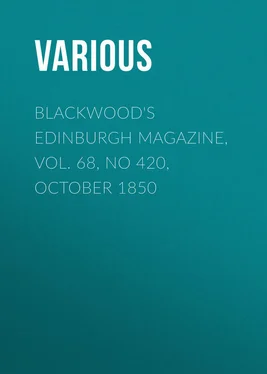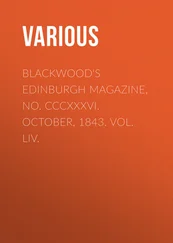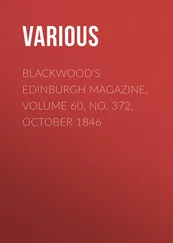Various - Blackwood's Edinburgh Magazine, Vol. 68, No 420, October 1850
Здесь есть возможность читать онлайн «Various - Blackwood's Edinburgh Magazine, Vol. 68, No 420, October 1850» — ознакомительный отрывок электронной книги совершенно бесплатно, а после прочтения отрывка купить полную версию. В некоторых случаях можно слушать аудио, скачать через торрент в формате fb2 и присутствует краткое содержание. Издательство: Иностранный паблик, Жанр: periodic, foreign_edu, Путешествия и география, на английском языке. Описание произведения, (предисловие) а так же отзывы посетителей доступны на портале библиотеки ЛибКат.
- Название:Blackwood's Edinburgh Magazine, Vol. 68, No 420, October 1850
- Автор:
- Издательство:Иностранный паблик
- Жанр:
- Год:неизвестен
- ISBN:нет данных
- Рейтинг книги:4 / 5. Голосов: 1
-
Избранное:Добавить в избранное
- Отзывы:
-
Ваша оценка:
- 80
- 1
- 2
- 3
- 4
- 5
Blackwood's Edinburgh Magazine, Vol. 68, No 420, October 1850: краткое содержание, описание и аннотация
Предлагаем к чтению аннотацию, описание, краткое содержание или предисловие (зависит от того, что написал сам автор книги «Blackwood's Edinburgh Magazine, Vol. 68, No 420, October 1850»). Если вы не нашли необходимую информацию о книге — напишите в комментариях, мы постараемся отыскать её.
Blackwood's Edinburgh Magazine, Vol. 68, No 420, October 1850 — читать онлайн ознакомительный отрывок
Ниже представлен текст книги, разбитый по страницам. Система сохранения места последней прочитанной страницы, позволяет с удобством читать онлайн бесплатно книгу «Blackwood's Edinburgh Magazine, Vol. 68, No 420, October 1850», без необходимости каждый раз заново искать на чём Вы остановились. Поставьте закладку, и сможете в любой момент перейти на страницу, на которой закончили чтение.
Интервал:
Закладка:
The "trials" contained in the volumes before us are fifteen in number, of which only four, or at most five, (Mr Townsend seems to have thought six,) have any pretensions to be designated " State trials." These five are – John Frost, Edward Oxford, and Smith O'Brien for high treason; Daniel O'Connell, and eight others, for a treasonable conspiracy; and Charles Pinney, for alleged neglect of his duty as mayor of Bristol, during the fiery and bloody "Reform Riots," as the were called, in that place, in October 1831. The remaining ten trials consist of two for duelling – the late James Stuart for killing Sir Alexander Boswell, and the Earl of Cardigan for shooting Captain Tucket; three for murder, (in addition to James Stuart, who was tried for the murder of Sir Alexander Boswell) – viz. Conrvoisier for the murder of Lord William Russell; M'Naughton for the murder of Mr Drummond; Hunter and others for conspiracy and the murder of John Smith, the Glasgow cotton-spinner, in 1837; Alexander (the titular Earl of Stirling) for forgery; Lord Cochrane, and seven others, for a conspiracy to raise the funds; the Wakefields for conspiracy, and abduction of an heiress; John Ambrose Williams for a libel on the Durham clergy; and Mr John Moxon, for blasphemy, in publishing the poems of Percy Bysshe Shelley. It will be observed that all these are criminal trials, and occurred in England, Scotland, and Ireland; affording thus a favourable opportunity for comparing the different methods of proceeding in their respective courts, and the characteristics of their respective judges and advocates. The English trials are ten, the Scottish three, and the Irish two in number: and whether they are precisely those which could have been most advantageously selected, it were needless, for present purposes, to inquire. Mr Townsend made his choice, and thus generally states his objects and intentions: —
"The present edition of Modern State Trials is meant to include those of the most general interest and importance which have occurred during the last thirty years. None are inserted in these volumes which have been previously comprised in any collection; but the editor regrets want of space, which compels him to omit several not uninstructive. In making a selection, he has endeavoured to present a faithful, but abridged, report of such legal proceedings as would be most likely to command the attention of all members of the community, and to be read by them with pleasure and profit. This appears to be the popular description of the term "State Trials," in which Mr Evelyn and Mr Hargreave acquiesced, or they would not have included convictions for witchcraft, and the prosecution of Elizabeth Canning for perjury, in their collection. Were the definition restricted to political offences merely, the work, however logically correct, would be wanting in spirit and variety." – (Introd. vol. i. p. 5.)
After stating that no technical objection can be raised to those of the above trials which immediately affect the State, he observes, that, "for the propriety of inserting the rest under the same title, a just apology may be made." The trial of the Earl of Cardigan, before the House of Lords, is represented as interesting, from the rank of the accused and from the rarity of the trial, as being the first time that duelling was attempted to be brought within a recent statute, (1 Vict. c. 85) enacting that the shooting at a person, not with premeditated malice, but deliberately, and causing a bodily injury dangerous to life, should be a capital offence; and that whoever should shoot any person with intent to commit murder, or to do some grievous bodily harm, should, though no bodily harm were inflicted, be guilty of felony , and liable to transportation or imprisonment. The social position of the titular Earl of Stirling, and the extraordinary nature of the evidence, are said to justify the insertion of his trial; while, "in the records of criminal jurisprudence, there occur few proceedings of more deep and painful interest than the prosecution of Lord Cochrane, for Conspiracy to commit a fraud on the Stock Exchange." The two cases of Courvoisier and M'Naughton respectively "involve topics of absorbing interest at the period of the occurrence, and of enduring interest to all time: in the one being involved the rights and duties, the privileges and immunities of counsel for prisoners; in the other, the fearful question of responsibility for crime – how far moral insanity alone may exonerate the alleged subject of it from the temporal consequences of his guilt." This latter topic is also involved in Oxford's case. The trials of Mr Stuart for killing Sir Alexander Boswell, and of Mr Moxon for blasphemy, are inserted for one and the same reason – namely, "a desire to embalm the very beautiful speeches of Lord Cockburn, Lord Jeffrey, and Mr Justice Talfourd." As to the trial of Ambrose Williams, it is inserted on account of the celebrated speech in defence by Lord Brougham – "one of the most vivid specimens extant, in either ancient or modern literature, of keen irony, bitter sarcasm, and vehement vituperation." The prosecution of the Wakefields for conspiracy, and the abduction of Miss Turner, "forms a singular chapter in legal history; interesting not less to the student of human nature, on account of its characters and incidents, than to the lawyer, for the elaborate discussions on the Scottish law of marriages, and the right of the wife, even should there have been a legal marriage, to appear as a witness against the offending husband – matters argued with profuse learning and ability."
"In setting forth, under a condensed form," says Mr Townsend, 3 3 Introduction, vol. i., p. 7, 8.
"this and the other most interesting trials of our time, it has been the object of the editor to free the work from dry severity by introducing the ' loci lætiores ' of the advocates, the salient parts of cross-examination – those little passages of arms between the rival combatants which diversified the arena, the painting of the forensic scene, the poetry of action of these legal dramas. He has sought to give the expressed spirit of eloquence and law, upon occasions which peculiarly called them forth; pruning what was redundant, rejecting superfluities, weeding out irrelevant matter, but omitting no incident or episode that all intelligent witness would have been disappointed at not hearing."
We present the ensuing paragraph, which immediately follows the preceding, because it will afford us an opportunity of making a remark which is applicable to the entire structure of the work before us.
"In the extracts here given from some of the most celebrated speeches of modern days, the editor has also had the great advantage of the last corrections of the speakers themselves, and has thus been enabled to preserve the ipsissima verba , by which minds were captivated and verdicts won; those treasures of oratory which would have gladdened the old age of Erskine, could he have seen how his talisman had been passed from hand to hand, and the mantle of his inspiration caught. The vivid appeals of Whiteside, the magnificent defence of Cockburn, the persuasive imagery of Talfourd, will exist as κθηματα ἑις αεἱ – trophies of forensic eloquence, beacon lights it may be, in the midst of that prosaic mistiness which has begun to creep around our courts."
The remark to which we have alluded is this: that the work before us is pervaded by a tone of uniform, excessive, and undistinguishing eulogy , which, however creditable to the amiable and generous dispenser of it, is calculated to lower our estimate of his critical judgment, and even – unless one should be on one's guard – to provoke a harsh and disparaging spirit towards the subjects of such undue eulogy, and a suspicion that here "praise undeserved," and the remark is applicable equally to praise "excessive, is censure in disguise!" No judge, no counsel, can say or do anything , in the course of any of the trials here brought under our notice, without speaking and acting in such a way as to merit applause for exhibiting the highest qualities of mind and character. Let it not be supposed, that, in making these observations, we wish to apply them to the particular instances cited by Mr Townsend of Messrs Whiteside, Cockburn, and Talfourd – all of whom are distinguished, accomplished, able, and eloquent advocates; but we believe that each would, in spite of the fondest self-love, in his own mind, somewhat mistrust his title to the amount of applause here bestowed upon him. What more than he has said of them, could he have said of the greatest orators and advocates whom the world has produced? In a corresponding strain, Mr Townsend speaks of every one – senior and junior counsel – and every writer, great and small, whom he has occasion to mention. Those who knew the late Mr Townsend, and appreciated his simple and manly character, will refer the defect which we have felt compelled thus to point out to its true cause – the kindliness of his heart; and we believe that, had he lived to see these observations, his candour would have caused him promptly to recognise their justice.
Читать дальшеИнтервал:
Закладка:
Похожие книги на «Blackwood's Edinburgh Magazine, Vol. 68, No 420, October 1850»
Представляем Вашему вниманию похожие книги на «Blackwood's Edinburgh Magazine, Vol. 68, No 420, October 1850» списком для выбора. Мы отобрали схожую по названию и смыслу литературу в надежде предоставить читателям больше вариантов отыскать новые, интересные, ещё непрочитанные произведения.
Обсуждение, отзывы о книге «Blackwood's Edinburgh Magazine, Vol. 68, No 420, October 1850» и просто собственные мнения читателей. Оставьте ваши комментарии, напишите, что Вы думаете о произведении, его смысле или главных героях. Укажите что конкретно понравилось, а что нет, и почему Вы так считаете.












